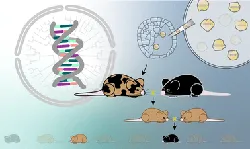
Genetics: Analysis and Applications 
This course provides an in-depth exploration of genetics, building on the concepts of biochemistry, genetics, and molecular biology from the 7.00x Introductory Biology MOOC. It covers topics such as differences between genotypes and phenotypes, genetic inheritance, and genetic engineering. Students will gain a comprehensive understanding of the fundamentals of genetics. ▼
ADVERTISEMENT
Course Feature
![]() Cost:
Cost:
Free
![]() Provider:
Provider:
Edx
![]() Certificate:
Certificate:
Paid Certification
![]() Language:
Language:
English
![]() Start Date:
Start Date:
10th Jan, 2023
Course Overview
❗The content presented here is sourced directly from Edx platform. For comprehensive course details, including enrollment information, simply click on the 'Go to class' link on our website.
Updated in [February 21st, 2023]
This is the second genetics course in a three-part series. Building upon the concepts from biochemistry, genetics, and molecular biology from our 7.00x Introductory Biology MOOC, these genetics courses go to a new level of depth. What are different types of genetic changes? How do nature and scientists create these genetic variations? How do we design and perform analyses to identify the genetic basis of a trait or disease?
Professors Peter Reddien and Mary Gehring will challenge you to expand your understanding of genetics. You will study the variety of genetic changes, different approaches to genetic analyses, and the impact of genetics on development and behavior.
We developed the 7.03x Genetics series with an emphasis on:
Developing your scientific thinking skills including articulating hypotheses, designing experiments, performing thought experiments, and interpreting data.
Using data based on real scientific experiments and highlighting the scientific process in assessments.
Asserting that biology is an active field that changes daily through examples of research and relevance to medicine, not static information in a textbook.
Uniting themes and principles that inform how scientists conduct and interpret research.
Implementing the science of learning in the course design.
(Please note that we obtained the following content based on information that users may want to know, such as skills, applicable scenarios, future development, etc., combined with AI tools, and have been manually reviewed)
Learners can learn from this course in three main areas: genetic changes, genetic analyses, and the impact of genetics. They will gain an understanding of the different types of genetic changes, how nature and scientists create these genetic variations, and how to design and perform analyses to identify the genetic basis of a trait or disease. They will also learn how to develop their scientific thinking skills, use data from real scientific experiments, and understand the relevance of biology to medicine. Finally, they will be able to identify themes and principles that inform how scientists conduct and interpret research, as well as how to implement the science of learning in course design.
[Applications]
Upon completion of this course, students should be able to apply the concepts of genetics to their own research. They should be able to articulate hypotheses, design experiments, and interpret data. Students should also be able to identify the genetic basis of a trait or disease, and understand the impact of genetics on development and behavior. Additionally, students should be able to recognize the importance of uniting themes and principles that inform how scientists conduct and interpret research.
[Career Paths]
1. Genetic Counselor: Genetic counselors are healthcare professionals who provide information and support to individuals and families who have, or may be at risk for, genetic conditions. They help individuals understand and adapt to the medical, psychological, and familial implications of genetic contributions to disease. As the field of genetics continues to expand, the demand for genetic counselors is expected to grow.
2. Geneticist: Geneticists are scientists who study the structure and function of genes, genetic variation, and heredity in living organisms. They use a variety of techniques to identify, analyze, and interpret genetic information. Geneticists are employed in a variety of settings, including research laboratories, universities, and biotechnology companies.
3. Bioinformatician: Bioinformaticians use computer science, mathematics, and statistics to analyze and interpret biological data. They develop and use software tools to analyze large datasets, such as those generated by genome sequencing projects. Bioinformaticians are employed in a variety of settings, including research laboratories, universities, and biotechnology companies.
4. Molecular Biologist: Molecular biologists study the structure and function of molecules, such as DNA and proteins, and their role in the development and functioning of living organisms. They use a variety of techniques to identify, analyze, and interpret genetic information. Molecular biologists are employed in a variety of settings, including research laboratories, universities, and biotechnology companies.
[Education Paths]
1. Bachelor of Science in Genetics: This degree program provides students with a comprehensive understanding of the principles of genetics, including the structure and function of genes, the genetic basis of disease, and the application of genetic technologies. Students will also gain an understanding of the ethical and legal implications of genetic research. This degree is ideal for those interested in pursuing a career in genetics research, biotechnology, or genetic counseling.
2. Master of Science in Genetics: This degree program provides students with an advanced understanding of the principles of genetics, including the structure and function of genes, the genetic basis of disease, and the application of genetic technologies. Students will also gain an understanding of the ethical and legal implications of genetic research. This degree is ideal for those interested in pursuing a career in genetics research, biotechnology, or genetic counseling.
3. Doctor of Philosophy in Genetics: This degree program provides students with an in-depth understanding of the principles of genetics, including the structure and function of genes, the genetic basis of disease, and the application of genetic technologies. Students will also gain an understanding of the ethical and legal implications of genetic research. This degree is ideal for those interested in pursuing a career in genetics research, biotechnology, or genetic counseling.
4. Master of Public Health in Genetics: This degree program provides students with an understanding of the principles of genetics, including the structure and function of genes, the genetic basis of disease, and the application of genetic technologies. Students will also gain an understanding of the ethical and legal implications of genetic research, as well as the public health implications of genetic research. This degree is ideal for those interested in pursuing a career in public health, genetics research, biotechnology, or genetic counseling.
The development trends for these degree paths are focused on the application of genetics to a variety of fields, such as medicine, public health, biotechnology, and genetic counseling. As the field of genetics continues to evolve, so too will the degree paths available to students. Additionally, the ethical and legal implications of genetic research will become increasingly important, and students will need to be prepared to address these issues.
Course Provider

Provider Edx's Stats at AZClass
Discussion and Reviews
0.0 (Based on 0 reviews)
Explore Similar Online Courses

Essential Guide to the dnf Package Manager in Linux Top Docs from Linode

MSPTDA 18: DAX Iterators Table Functions Grain Cardinality Materializing Tables Excel & Power BI

Python for Informatics: Exploring Information

Social Network Analysis

Introduction to Systematic Review and Meta-Analysis

The Analytics Edge

DCO042 - Python For Informatics

Causal Diagrams: Draw Your Assumptions Before Your Conclusions

Whole genome sequencing of bacterial genomes - tools and applications

Biology 102: Basic Genetics

Introduction to Genetics: Certificate Program


Start your review of Genetics: Analysis and Applications